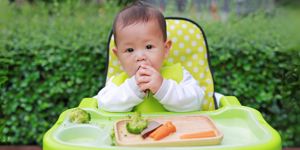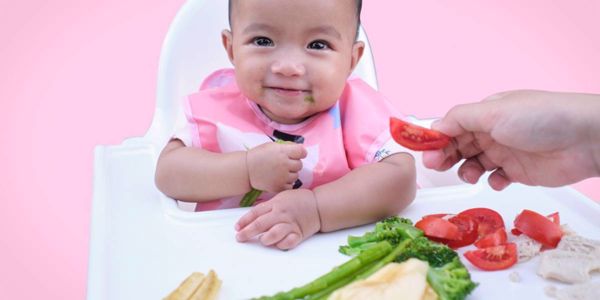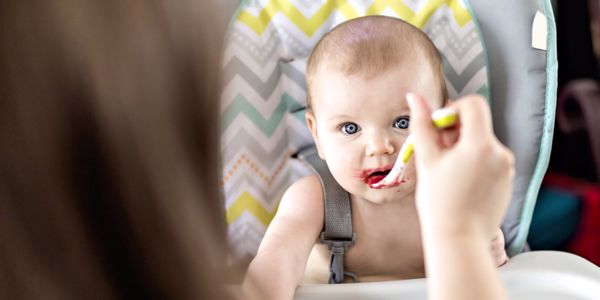If you’re preparing yourself for the wonderful world of baby-led weaning (BLW) you’ve come to the right place. Here, you’ll find easy-to-read information about when to start and how to navigate their first foods journey without the stress.
BLW usually starts at around six months of age – it’s all about looking for signs of readiness. At the six-month mark, babies are usually developmentally ready to explore solid foods. They should be able to sit up independently and hold their head, grasp objects and be able to bring food to their mouths. A quick way to test if your baby is ready to swallow solid food is to observe if they push food out of their mouth with their tongue. If they do, it means they might not be quite ready.
Does My Baby Need Teeth to Baby-led Wean?
Are you wondering whether your little one needs teeth to be able to chew food? You might be surprised to know that actually, they don’t; they can manage pieces of food pretty well without them.
Why is Baby-led Weaning a Great Idea?
According to the Queen of Wean, Annabel Karmel, BLW is great for encouraging your child’s independence, as well as excellent practice for hand to eye coordination. Some parents prefer BLW to spoon-feeding, but you might find it comes pretty naturally to combine a bit of both.
Choosing Safe Foods for BLW
When starting out on your baby-led weaning journey, it’s all about choosing safe foods and starting soft. Opt for soft, squidgy veggies that you can cut into finger-sized food that will be easy for your baby to pick up, put in their mouth and chew.
Child nutritionist and weaning expert Charlotte Stirling Reed recommends starting with veggies. Not only will veggies give your baby the essential nutrients, they help develop a palate for savoury flavours, establishing healthy eating habits and minimising the chances of your baby developing a preference for sweet foods.
Veggies are also super easy to boil or steam. You don’t need a fancy blender - unless you want one. Think broccoli florets, asparagus and cauliflower and you’ve got yourself a great little menu. Don’t be deterred if your baby refuses a new taste or texture. It can take a baby up to 15 times to accept a new food, so persistence and patience are key!
Once those foods have been established, move on to sweeter tastes, such as soft carrots, sweet potato, juicy avocado and ripe fruits such as kiwi, banana, melon, mango and orange slices.
It goes without saying to avoid hard or round foods like whole nuts or grapes.
Supervise, Supervise, Supervise
When it comes to BLW, supervision is non-negotiable. Stay close and keep a watchful eye as your baby explores new textures and tastes. Baby-led weaning is all about fostering independence while prioritising their safety.
Allergy Awareness
The NHS advises us to introduce foods that may trigger allergic reactions to your baby one at a time. These foods can be introduced from around 6 months as part of your baby’s BLW journey. Once you’ve introduced these foods successfully, keep them routinely in their diet, to minimise the risk of allergy.
- Cows’ milk (in cooking or mixed with food)
- Eggs (avoid eggs without a red lion stamp or cook thoroughly)
- Foods containing gluten. Includes wheat, barley and rye
- Nuts and peanuts (ALWAYS serve crushed or ground)
- Seeds (ALWAYS serve crushed or ground)
- Soya
- Fish
When introducing any food, watch closely for rashes, swelling or difficulty in breathing. If you have any concerns about introducing a specific food, especially one of the listed allergens, consult your GP or health visitor.
Embrace the Mess
BLW is messy—there's no way around it! I used to wonder why I didn’t serve the food directly to the floor, as it all seemed to end up there. It’s time to embrace the food flinging and let your little one enjoy exploring the different tastes and textures with their hands. Top tip - a splash mat under the high chair can be a lifesaver for a quick clean-up!
Relax and Enjoy
Above all, remember that BLW is a journey of discovery for both you and your baby. It's okay to feel a bit anxious at first but trust that your little one is learning and growing with every messy bite. It’s important to figure out your baby’s cues and trust their own ability to self-regulate when it comes to the amount they need. It’s a new learning curve that can require a bit of patience!







